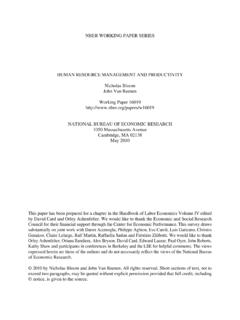Transcription of Management in Healthcare: Why good practice …
1 Management in healthcare : Why good practice really matters 2. Stephen Dorgan McKinsey & Company Dennis Layton McKinsey & Company Nicholas Bloom Stanford University Centre for Economic Performance, London School of Economics Rebecca Homkes Centre for Economic Performance, London School of Economics Raffaella Sadun Harvard Business School Centre for Economic Performance, London School of Economics John Van Reenen Centre for Economic Performance, London School of Economics Management Matters: Why good practice really matters 3. Executive summary 1 Hospital-specific Management practices are strongly related to a hospital's quality of patient care and productivity outcomes.
2 For example, this research shows that improved Management practices in hospitals are associated with significantly lower mortality rates and better financial performance. 2. Across countries, there is a wide variation in Management scores. The United Kingdom delivers particularly strong hospital- Management practices relative to its health expenditure. 3. There is significant variation in the quality of hospital Management practices within a country, which is much greater than the average differences across countries. This suggests a great opportunity for improving poorly performing hospitals. 4. There is a strong relationship between a number of factors and effective Management practices .
3 In particular: Competition helps improve managerial standards. H. ospitals with clinically qualified managers are associated with much better Management scores. Higher-scoring hospitals give managers higher levels of autonomy than lower-performing hospitals. This finding is consistent with McKinsey's own experience in hospitals and with the Service Line Management approach co-developed with Monitor, which aims to devolve decision making and accountability to the front line. Scale and size matter. Larger hospitals are better managed. W. hen it comes to ownership, private hospitals (including not-for-profits) achieve higher Management scores than public hospitals across all countries.
4 5. The findings of this and previous research by the same team point to significant implications for UK policy makers, Academic Health Science Centres, commissioners, hospitals, investors, and, most importantly, patients. These implications are further discussed in the final section of this report. The individual hospital- Management scores from the Management Matters project are confidential, but hospitals can assess their own Management practices through a free online tool at Further analytical detail can be found at 4. The Management Matters project The Management Matters Research project is an ongoing joint venture between McKinsey & Company and the Centre for Economic Performance at the London School of Economics, in collaboration with academics from Stanford and Harvard universities.
5 When we began this research project in 2001, we believed that a company's Management practices were likely to have a strong effect on its performance. We also believed that this effect might be stronger than many of the other factors that determine whether a business succeeds such as national culture, market conditions, and regulation. To examine this hypothesis, we developed a tool to assess overall Management practice and compare it with company performance. This tool measures Management practices in three broad areas: operations Management , performance Management , and talent (people) Management . Over the years we have conducted interviews with more than 6,000 manufacturing companies across 19 countries in North and South America, Europe, Asia, and Australasia.
6 These earlier studies showed a strong relationship between Management practice and manufacturing company outcomes, as seen in Exhibit 1 below. Exhibit 1. Management practices and measures of financial performance are tightly linked according to our research on over 6,000 firms globally 1 2. 3. 1 Sales per employee 2 Return on Capital Employed 3 Tobin's Q assuming constant book value Management Matters: Why good practice really matters 5. In 2006, we began applying the same methodology to 104 National Health Service Hospitals and 22 private hospitals in the United Kingdom; then in 2009 we extended the research to 1,194 hospitals in the United States, United Kingdom, Canada, Sweden, Germany, France, and Italy.
7 Unless stated otherwise, this report uses the 2009 data only in order to be comparable across countries. Our research methodology is presented in Appendix A. This report details the findings of that research in respect of Management practices and outcomes in hospitals and lays the foundation for future areas of inquiry. 6. Management Matters: Why good practice really matters 7. Introduction healthcare expenditure represents a major challenge for all countries, absorbing an increasing percentage of national income. Nations are grappling with increases in demand for healthcare as their populations age and expectations rise along with living standards.
8 At the same time, industrialised countries face budgetary shortfalls. As these nations seek to control healthcare costs, an unbalanced focus on cost can carry unacceptable consequences; therefore health systems across the developed world are focusing on enhancing quality and productivity. Implementing systemic change is daunting, but the results from this latest Management Matters in healthcare research provide an optimistic message: improving Management practices is a way to raise both quality and productivity. Thus, instilling better Management practices could be a key part of addressing difficult challenges. Hospital- Management practices are related to quality and productivity outcomes A research team of more than 40 interviewers conducted interviews with almost 1,200 hospitals in Canada, France, Germany, Italy, Sweden, the United Kingdom, and the United States.
9 The team also collected hospital- level outcome statistics where they are available publicly (mostly in the United States and United Kingdom), or through the McKinsey Hospital Institute. As a result of this research, a strong relationship was established between specific hospital Management practice scores and specific hospital health outcomes. The Management practices assessed were those determining how well hospital operations, performance, and talent were managed. We found that hospitals with higher Management - practice scores had better clinical outcomes, such as lower mortality rates from emergency heart attacks1, as well as higher levels of patient satisfaction and better financial performance.
10 For example, in the United Kingdom a one-point improvement in the Management - practice score is associated with a 6 percent fall in the rate of deaths from heart attacks. This is consistent with our previous research into manufacturing companies, which showed correlations between our assessed Management - practice score and a range of corporate performance metrics such as productivity, profitability, and companies' survival rates. Exhibit 2. There is a strong relationship between Management practices and health outcomes UK Management practice score and heart attack mortality rates*. 105. 95 95. 90. Bottom quartile 3rd quartile 2nd quartile Top quartile Management practice score *30 Days risk adjusted AMI Mortality rate (indexed to national average).








